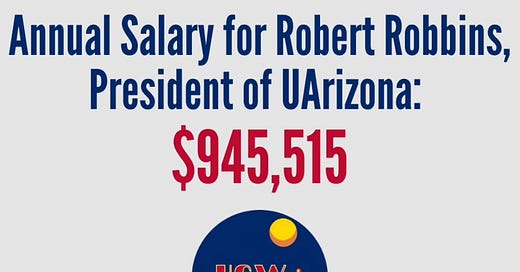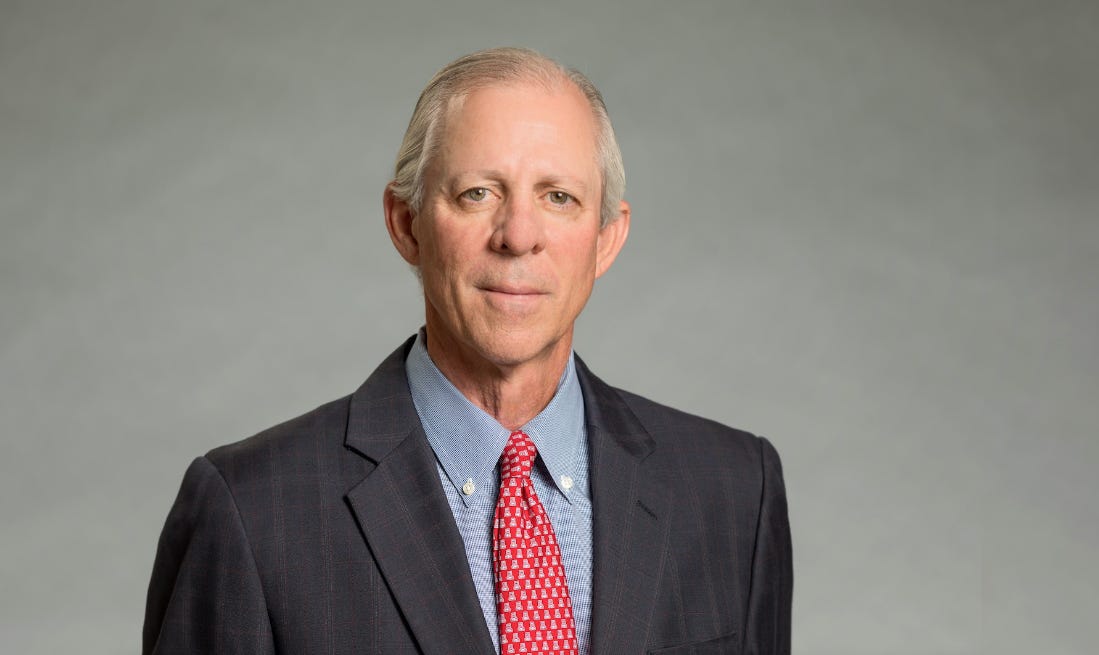The Daily Agenda: A “kick in the teeth” to UA staffers
The campus community had plenty to say about the University of Arizona’s ousted CFO’s new position… Spoiler alert: None of it was good … Starting a wildfire will cost you.
When we broke the news yesterday that the University of Arizona is still employing its recently ousted chief financial officer, we figured the campus community would have some thoughts on the matter.
In case you missed it, Lisa Rulney “resigned” in December, six weeks after UA President Robert C. Robbins told regents the school had miscalculated its finances to the tune of $240 million.
Robbins wished Rulney well when he announced her resignation to the Arizona Board of Regents and the press, but it turned out she wasn’t going far. Rulney is still working on campus. She just stepped into the temporary role of senior advisor for business operations. And she’s still making the same $500,000 annual salary that came with her previous position.
Representatives from three campus groups were happy to talk to us about what one called the “unfolding train wreck” at the UA.
Associate Professor Leila Hudson, chair of the Faculty Senate, told us she sees a “pattern of behavior” by Robbins that “undermines trust and seems deceptive.” Robbins announces the resignation of a prominent administrator so it looks like he’s holding them accountable, but then quietly lets them take another job at the UA.
Hudson pointed to former Senior Vice President and Provost Liesl Folks, who stepped down in May after the fatal shooting of hydrology professor Dr. Thomas Meixner and the ensuing intense scrutiny over campus safety.
But like Rulney, Folks didn’t really ever leave. She stayed on as associated professor of electrical and computer engineering and serves as vice president for semiconductor strategy (she also is a professor of electrical and computer engineering).
“The sheer mendacity of this performative resignation really is so inappropriate,” Hudson said. “I don’t blame Lisa Rulney herself. This is about the people who continue to make decisions at a higher level.”
Hudson said campus employees are “losing their minds.” The general consensus is that the person who got the school into this mess should be nowhere near the process of trying to dig it out, “and certainly not at the same salary.”
The move also sets back the trust the administration and the faculty senate have been working to rebuild since March’s vote of “no confidence” in Robbins following Meixner’s death, Hudson said.
After the November announcement of the UA’s budget issues, the faculty senate agreed to a “temporary period of belt-tightening” in the spirit of collaboration and helping the school get back on track, despite the fact that spending within academic departments was not where the bulk of the mismanaged money was spent, Hudson said.
“The issue staff feels really strongly about is senior administrative bloat, and that’s where these two storylines intersect,” Hudson said. “This feels like a kick in the teeth to all the people whose salaries have not caught up with the cost of living and who are treated disrespectfully in all matters by senior administration.”
With the news of Rulney’s retention breaking just 24 hours ago, the faculty senate hasn’t yet discussed next steps, although they’ve previously requested an outside audit of university finances.
The president of the UA’s Graduate and Professional Student Council is also asking for an independent audit of university finances, saying the public deserves to “see the full picture of how this financial machine has been run.”
“The news of Lisa Rulney’s reinstatement crystallizes the idea that this is a management crisis masquerading as a financial crisis,” GPSC President Jeremy Bernick said in an email to the Tucson Agenda. “By hiding behind yet another closed door and through the opaque wordsmith-ing of its corporate PR team, the UA leadership has further eroded the trust of its most essential communities: its students.”
Bernick called for accountability by administrators, saying that beyond the “poor fiscal decision-making abilities” of its senior leadership team, the UA is in relatively good economic health.
But you wouldn’t know it from some of the changes brought on by the budget shortfall. Last month, the UA did away with its four-year tuition guarantee, meaning incoming students will pay more for their education as seniors than they do as freshmen (and for non-resident students, the difference is significant.) Robbins also enacted hiring and salary increase freezes and reduced the amount of financial aid available to out-of-state students.
This means that while Rulney has managed to retain her salary and a leadership position at the UA, students and staff are paying for administrators’ mistakes, which Bernick and others say is outrageous.
The United Campus Workers-Arizona were vocal on social media and campus about the failure of accountability by senior administrators in the weeks following the announcement of the crisis. They launched a campaign to educate the public on the major salary discrepancies that exist on campus. In a series of Instagram posts, UCW-AZ featured the salaries of UA leadership and higher-ups in the athletics department, comparing their six and seven-figure salaries to line-level workers, some of whose salaries are just $21,840 a year.
“It’s so outrageous that UA workers are facing these consequences,” UCW-AZ member Maria Sohn Hasman told us. “We’re seeing a hiring freeze, which is increasing workloads across campus; salary increase freezes, which are effectively a pay cut; and layoffs.”
Meanwhile, Hasman said, Robbins and others were going to extreme lengths to protect their inflated salaries and positions, calling their actions “administrative gymnastics.”
“This is the continuation and the next level of their lack of accountability and unwillingness to change any of the conditions on campus,” she said.
The faculty senate’s Hudson said she was supposed to meet yesterday with Interim CFO and ABOR Executive Director John Arnold to let him know they’re interested in moving forward and working towards a solution. She said she’s hopeful the meeting will happen in upcoming weeks and that Arnold, an experienced budget manager, can help the university get back on track.
We reached out to Arnold to ask if ABOR was aware that Rulney would be staying on in another capacity or if he was consulted as Interim CFO about the decision, but we didn’t hear back by deadline.
We’re committed to investigating issues that matter to our community and holding the people in power accountable, but we can’t do that without your support. Please consider upgrading to a paid subscription to help us continue this important work.
Cost of a tragedy: The University of Arizona settled a lawsuit filed by the family of Thomas Meixner, a professor who was shot and killed on campus by a student in October 2022, the Arizona Daily Star’s Ellie Wolfe reports. The family said it was a “multi-million dollar resolution.” UA officials said the settlement also includes commitments to support people affected by the shooting and to give Meixner’s family a voice in how new safety measures are put in place.
Everything under the sun: Tucson Sentinel columnist Blake Morlock dives deep into the agendas of pretty much every local governing body that has a public meeting coming up. The Tucson City Council plans to raise parking fees, the Pima Community College Governing Board is balking at supporting fare-free transit (but not exactly for the reason Tucson officials accuse them of), the Marana Town Council may approve food truck courts, and much, much more.
Whoops: A Tucson man who ignited the Molino II Fire last April agreed to pay $180,000 in restitution to the U.S. Forest Service, Arizona Public Media’s Katya Mendoza reports. He fired a shotgun at a homemade target two other men were using. Sparks from the impact started several small fires, which grew into a blaze that burned 115 acres near Mt. Lemmon highway and cost the forest service $200,000 to suppress. He was busted after the two men who owned the target filmed the incident and alerted authorities.
Lukeville got all the attention: The Border Patrol checkpoint on Interstate 19 quietly reopened last weekend after being closed since November, the Nogales International’s Angela Gervasi reports. Federal officials did not explain why the checkpoint near Tubac closed or why they reopened it, but they did speak generally about a decline in apprehensions of migrants in the Border Patrol’s Tucson Sector. Apprehensions remain at or near record highs, but Border Patrol officials said there was a decrease over the past few weeks.
Good stewards: Manzo Elementary is bringing climate change into the classroom, the Arizona Luminaria’s Noor Haghighi reports. Students tend a garden in class as a small-scale version of acting as planet-wide stewards. Their teachers are sensitive about talking to them about climate change, but they don’t hide it either. When the summer heat arrived early last year, some of the hawk nestlings that live in a tree on the school grounds jumped out of their nests before they could fly.
“It’s kind of a hard lesson to learn for younger kids, but it’s also very distinctive for them because they see it happening,” Randal Davidson, the school’s garden coordinator, told Haghighi.
$945,515: The annual salary of UA President Robert C. Robbins, which is substantially less than both men’s basketball coach Tommy Lloyd’s $3.6 million salary and football coach Jedd Fisch’s $2.1 million salary.
What do you think of the situation at the UA? Let us know in a letter to the editor.











I just want to say what a great job you're doing - the story about UA not really “firing” the CFO was startling and disturbing. Thank you for bringing it to light. May you last forever!
Fire every single person at UA making more than $250K/year and hire the food service cooks to do their jobs all at $100K/year. We would get some fresh ideas about the many bullshit jobs we pay too much for people to perform, but we would save a bundle and burn out a bunch of useless, entitled, and out-of-touch deadwood.